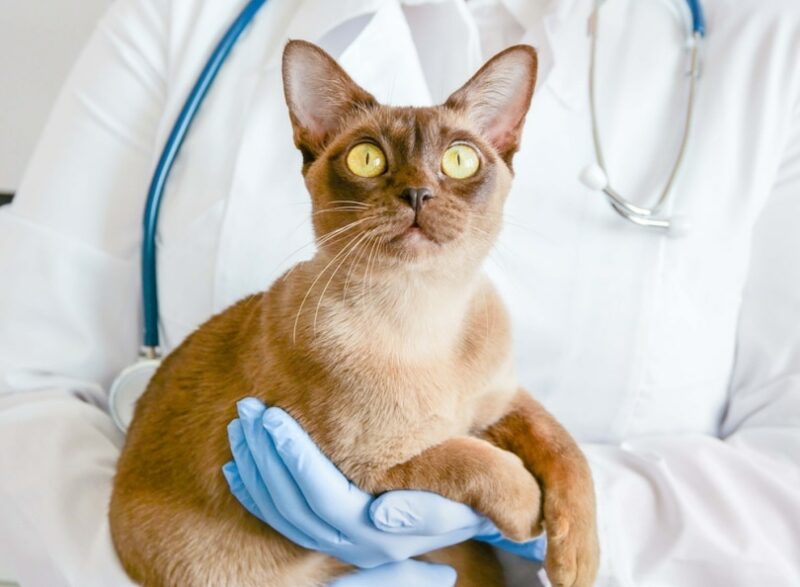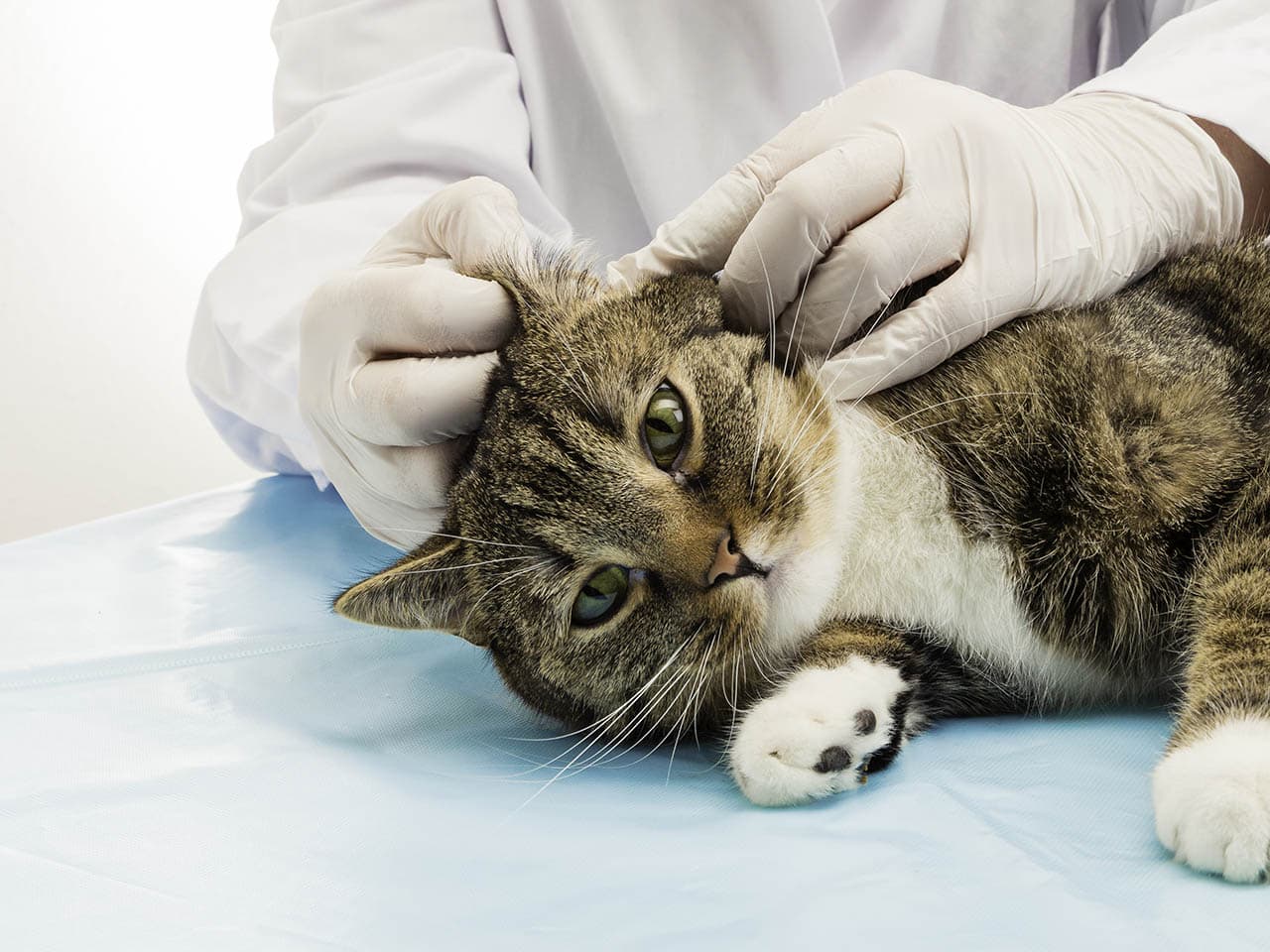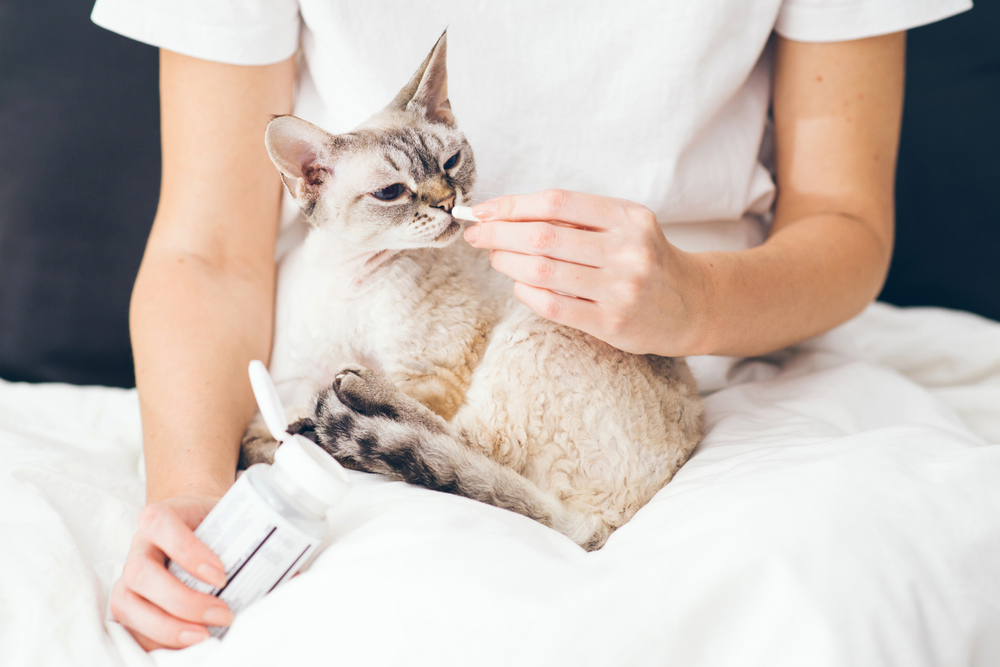Your cat’s two kidneys perform many vital functions in maintaining your pet’s health. They help eliminate toxins from the bloodstream (because they filtrate blood) and maintain water, electrolyte balance, acid-base balance, and blood pressure at normal values. They also regulate circulation and produce hormones (renin and erythropoietin). When the kidneys stop working properly, it can lead to severe health problems that can put your cat’s life in danger.
Cat owners often become worried and confused when they hear that their cat has been diagnosed with kidney disease. Such a diagnosis is never easy. Early detection of the signs of kidney disease is crucial because they usually occur after 75% or more of the kidney function has already been compromised. The sooner your cat is diagnosed, the more you will be able to slow down the progression of the disease.
Since kidney disease generally occurs in middle-aged and older cats from 7 years of age onwards, it is recommended that cats over 7 years be periodically evaluated, ideally every 6–12 months.
What Is Kidney Disease?
Kidney disease is a condition in which the kidneys partially or completely lose their ability to function normally. It is a progressive disease in which the products of catabolism and toxic substances are no longer eliminated by the kidneys but retained in the body.
It most frequently affects middle-aged and elderly cats (particularly geriatric cats over 12 years of age) and is the most common cause of death, alongside cancer and heart disease.1 The disease develops over periods of months or years. Approximately 20%–50% of cats older than 15 years have some stage of kidney damage.2 The frequency between the sexes is equal, though males are diagnosed at younger ages than females.
Kidney disease can be acute or chronic, and there are four stages of the disease. They are referred to as IRIS stages. Usually, it’s a chronic illness of older cats, lasting for months and years, while acute onset in younger animals occurs suddenly, often due to toxin ingestion, urethral obstruction, other organ system disease, low blood pressure, bacterial infection of the kidneys, and others. The fourth stage is also referred to as end-stage kidney failure, from which the vast majority of affected cats will not recover.
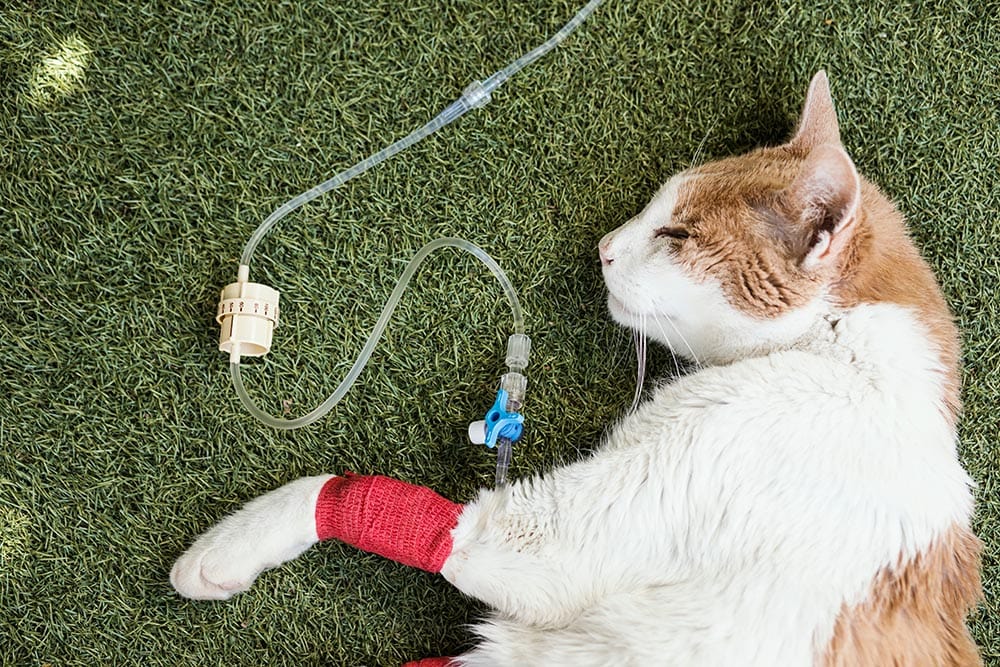
Acute Kidney Disease in Cats
Acute renal injury in cats is a condition with a sudden onset resulting from a decline in renal function, which sets in within a few hours or days. The initial clinical signs may include increased urine production, called polyuria, often followed by oliguria (the cat urinates less than usual) or anuria (the cat stops urinating). The cat can be thirsty in the beginning but will soon stop eating and drinking and become very lethargic. Some cats may develop a fever if the cause is bacterial.
This condition has multiple causes, such as obstruction due to urinary blockage or infection of the renal parenchyma (kidney tissue) and its functional units.
This type of kidney disease can be reversible if the cause is recognized and treated in time.
Chronic Kidney Disease in Cats
Chronic kidney disease (CKD) is a gradual and usually slowly progressive condition in which the functional unit of the kidney, the nephron, loses its functionality over a longer period of time.
When some of the nephrons are damaged, the others take over their function and compensate, but in time, their function will also reduce. This leads to the inability of the kidneys to fulfill their functions of absorption and excretion, making it impossible to successfully eliminate toxins from the body by filtering the blood and producing urine.
What Are the Signs of Kidney Disease in Cats?
The clinical signs of chronic kidney disease in cats are progressive and usually begin with an increase in thirst (polydipsia) and the amount of urine produced (polyuria). In general, the owner notices that their cat drinks more water and urinates more than usual. As the condition progresses and becomes chronic, the following signs appear:
- Lack of appetite
- Weight loss
- Specific breath smell (ammonia breath)
- Vomiting
- Diarrhea
- Pale mucous membranes
- Anemia
- Mouth ulcers
- Increase in blood pressure
- Dehydration
The more progressive the disease is, the shorter survival time is, as the treatment options are quite limited. Kidney values will eventually increase so much that the cat will not feel like wanting to eat or drink and may stop producing urine in some cases despite treatment.
Usually, at this time, a vet recommends euthanasia. If euthanasia is not performed, death occurs due to uremia (uremic intoxication), which is when the toxic substances that should be excreted through the urine remain in circulation in such a quantity and time that the body can no longer survive.
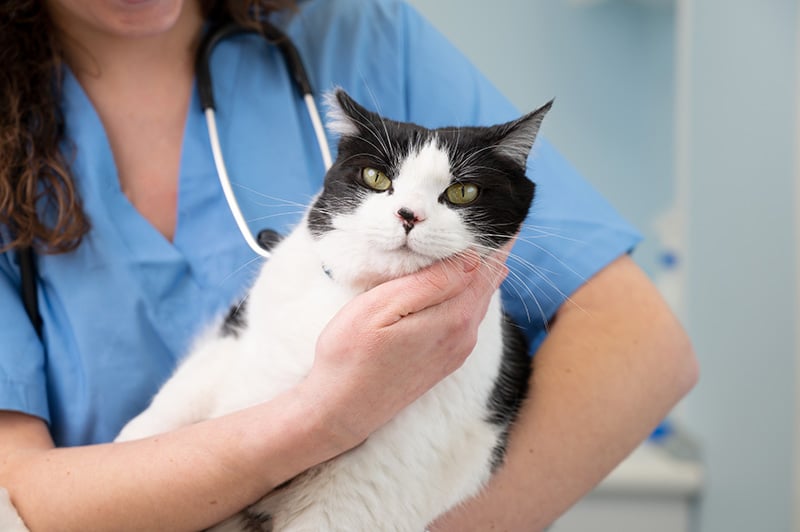
Acute kidney injury, or AKI, as already discussed, is rapid in development, and the signs are more obvious and severe. It can occur in cats of any age. It causes the kidney function to suddenly decline, making the cat feel very unwell, as there was no time for compensatory mechanisms present in CKD to properly activate. Acute kidney injury may lead to CKD if the damage to the kidneys is irreversible.
Both CKD and AKI require prompt veterinary attention and treatment, but with the acute illness, there is more urgency, as this disease is very progressive, and early treatment may mean the difference between full recovery and ongoing poor kidney function, impacting quality of life and longevity.
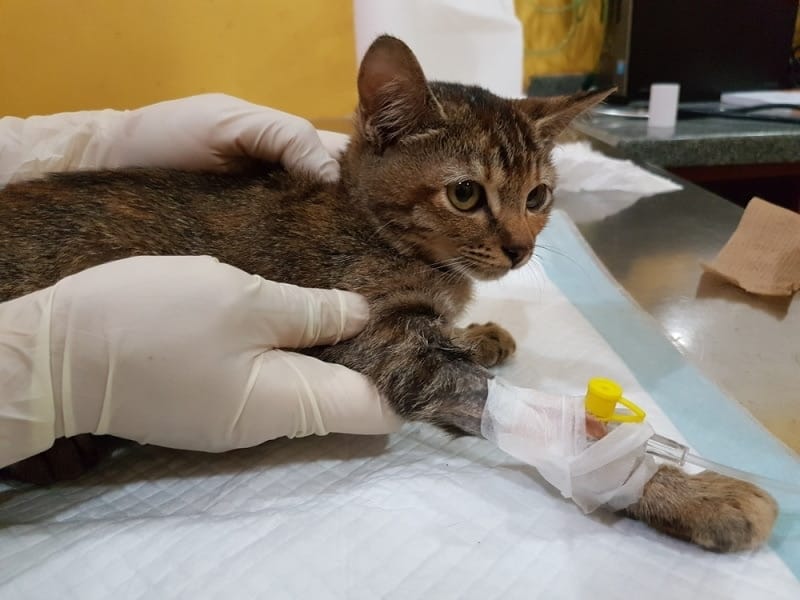
What Are the Causes of Kidney Disease?
The causes that can reduce the functionality of the kidneys in cats can be congenital, present since birth, or acquired, which is developed throughout the cat’s life and impacted by several different factors. Even congenital kidney disease may take years to exhibit clinical signs. All of them can lead to both acute and chronic kidney disease, while acute kidney injury may progress to CKD.
- Abyssinians, Siamese, Burmese, Tonkinese, Devon Rex, and Oriental Shorthair breeds are prone to amyloidosis.
- Himalayan and Persian are prone to polycystic kidney disease.
- Systemic infectious diseases (viral or bacterial)
- Inflammation
- Secondary kidney infections (glomerulonephritis)
- Cancer (e.g., lymphoma)
- Certain nephrotoxic drugs, including human anti-inflammatory drugs (aspirin, ibuprofen, etc.), antifungals, and chemotherapy drugs
- Other toxins, like antifreeze, toxic flowers (e.g., lily), pesticides, or cleaning products
- Urinary blockage at the level of ureters or the urethra
- Kidney stones
- Thyroid problems
- Advanced dental disease
- Trauma
- Burns
- Shock caused by massive blood loss or dehydration (e.g., car accident)
- Heart failure with low blood pressure
- Heatstroke
- Pyelonephritis (bacterial infection of the kidneys)
How Is Kidney Disease Diagnosed in Cats?
The diagnosis of kidney disease is usually established by blood tests—more precisely, by measuring urea, creatinine, and SDMA (symmetric dimethylarginine), products of metabolism that are eliminated through the kidneys. In general, these values start to increase from stage two as an early biomarker of kidney disease. Chronic kidney disease has four stages, and the diagnosis is adapted according to them.
Other parameters that can be measured in kidney disease are as follows:
- Phosphorus is often elevated
- Electrolytes (sodium, potassium, and chloride) often fluctuate between high and low levels, although potassium is generally low in cases of CKD
- High potassium levels in case of a urinary blockage
- Cats with CKD may sometimes have low calcium levels
- The number of red cells indicates an underlying chronic illness
- Symmetric dimethylarginine can be used for the early detection of kidney disease
- Specific gravity of urine determines how diluted or concentrated it is; the higher the number, the more concentrated the urine
- The ratio between urine protein and creatinine shows how much protein is lost in the urine
- A urine culture can detect urinary tract infections
- Cats with CKD often have high blood pressure
- Abdominal X-rays or ultrasounds can detect kidney stones, kidney enlargement, or stones in the ureters, bladder, or the urethra
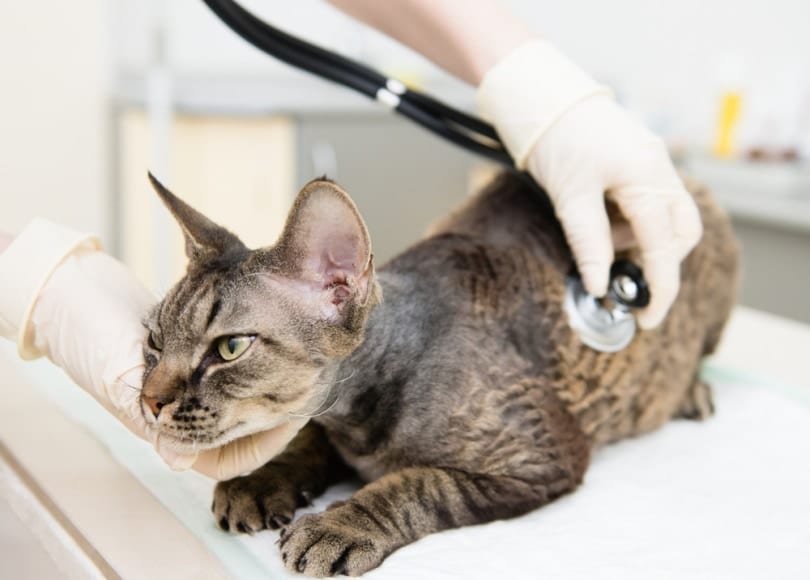
How Do I Care for a Cat With Kidney Disease?
If your cat has been diagnosed with kidney disease, you must follow the instructions of the veterinarian. Depending on the stage of the disease, they will also give you a prognosis:
- Cats classified in stage two have an average life expectancy of 3 years (up to 8.5 years).
- Cats classified in stage three have an average life expectancy between 1.8 and 5.7 years.
- Cats classified in stage four have an average life expectancy of 1.16 months.
Also, cats with kidney failure who follow an adequate diet may have a significantly longer survival time than those who do not consume a special diet.
- Proteins
- Vitamin supplements
- Antioxidants
- Omega-3 fatty acids
- Potassium
Alternatively, a homemade diet can be taken into consideration if it is formulated by a veterinarian expert in nutrition.
Don’t forget about water! A higher water intake (wet food and/or plenty of fresh water) may help cats suffering from kidney disease. To reduce stress, you can place more litter boxes and offer multiple water bowls. You can also use diffusers with feline pheromones and give your cat a place by a window where they can watch what is happening outside.
Depending on how your cat is getting on, which stage of kidney disease they are suffering from, and how they are responding to the dietary management, they may need extra medication for the high blood pressure or the presence of protein in the urine. Your veterinarian may also recommend periodical intravenous or subcutaneous fluids to your cat, which will help your cat stay hydrated by removing toxins from the blood. These can be administered every few weeks or months.
Frequently Asked Questions (FAQ)
Do Cats With Kidney Disease Experience Pain?
Cats suffering from stage four kidney disease may experience pain, which may be due to oral ulcers, inflammation of the stomach lining, and the accumulation of toxins in the blood. They may experience severe weakness, loss of coordination, and collapse. Cats suffering from acute kidney disease may feel pain in the kidney area because the kidneys are often enlarged or swollen. In other cases, when suffering from infections or urinary stones, they may feel pain when urinating.
Can Cat Kidneys Recover?
In chronic kidney disease, once the kidneys have been damaged, the recovery capacity is minimal. If early and adequate management of the disease is installed, it will evolve slowly, and your cat can have several years of quality life. In the case of acute kidney disease, the kidneys can recover if the condition is treated in time. Acute kidney disease can be a reversible condition.
Do Cats With Kidney Disease Meow Frequently?
Excessive meowing is not a characteristic sign of kidney disease, but it can occur. Cats that feel sick and have pain or nausea or have concurrent hyperthyroidism or feline cognitive decline may meow more than usual and become restless. If your cat suffers from kidney disease and meows excessively, take them to the vet. You can also place diffusers with feline pheromones in your home to eliminate stress.
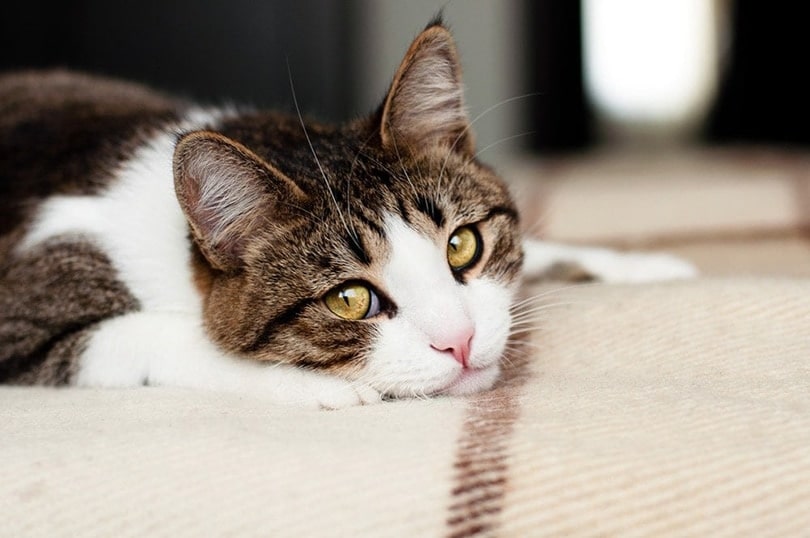

Conclusion
The diagnosis of kidney disease is always serious. It is a progressive condition in which cats lose their kidney function. The average life expectancy of cats diagnosed with this disease is approximately two years, but this can vary a lot depending on the time of diagnosis and stage of illness. Due to the toxins that accumulate in the blood, cats will have a general feeling of sickness and nausea. They may also vomit, will easily become dehydrated, and may even experience pain. If your cat is drinking more water than usual and urinating often, contact your veterinarian.
Featured Image Credit: Elpisterra, Shutterstock
Contents
- What Is Kidney Disease?
- What Are the Signs of Kidney Disease in Cats?
- What Are the Causes of Kidney Disease?
- How Is Kidney Disease Diagnosed in Cats?
- How Do I Care for a Cat With Kidney Disease?
- Frequently Asked Questions (FAQ)
- Do Cats With Kidney Disease Experience Pain?
- Can Cat Kidneys Recover?
- Do Cats With Kidney Disease Meow Frequently?
- Conclusion

